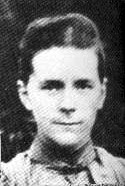Letters - 1896.11.21 Extract from her Annual Letter

Note
The portion of the letter below was written by MEB and extracted for publication for her missionary society’s annual report. The letter is dated November 21, 1896.
Letter
I certainly did not think a few weeks ago that I should have the pleasure of dating this letter from my own station. Certainly, from the Archdeacon’s account of this place and people, and from my own observation after being here four days, and seeing only a little of the people and their homes, I should say it would be difficult to find a darker spot in Hok-chiang. The people are wretchedly poor, and indescribably dirty and intensely ignorant, and quite content to be so; and yet I am full of hope, for I remember that He who made His weak disciples a power among their enemies, that He who caused them to triumph over every weakness and to manifest Him to an opposing world, is with us; and I believe that Miss Oatway and I will see triumphs of grace in this spot, which is already dear to my heart, and how much dearer to Him who counts a “little flock” in Keng-tau.
As I have only been in China since March, I can, of course, do very little. I am making, and have made, the language my chief work. I think I have only missed study one day. I find Chinese intensely interesting, and I do praise God that now that I have an opportunity of practicing what I know, I find that the people really understand me. We have a splendid little Bible-woman here, and she helps me a great deal when I am amongst the people, and encourages me to tell them quite simply a little about Jesus and His love. Then she enlarges upon it, and explains so beautifully and with such animation the story of the cross.
I had intended returning to Ko-sang-che today, but my teacher has unexpectedly gone to Fuh-chow for his examination, and will be away at least a fortnight, so I shall probably remain here, as I find every day adds to my stock of Chinese. I have very little to record of my first nine months in this land. What comes to me over and over, as the expression of my own feelings, is that word, “satisfied with favour, and full with the blessing of the Lord,” Blessed with good health, and allowed to live in this land, a joy to which I looked forward for ten years, enjoying the language and loving the people, I can only say, “My cup runnerth over.” Hallelujah!
Observations
You see here the raw reaction of a young English woman facing a culture and scoioeconomic setting totally different than her own. She is full of expectant vigor while also relating herself to the ‘weak disciples’ whom the Lord made ‘a power amongst their enemies.’ In her second paragraph, we see how instrumental the native ‘Bible-women’ were in preaching and teaching the Gospel.
She concludes her letter stating the joy she has at being allowed to finally live in China. She states that this is a joy she had, “looked forward (to) for ten years.” This is the only detail we have regarding why she offered herself to missionary service.
Bible References
- “satisfied with favour, and full with the blessing of the Lord,” is the blessing Moses bestowed upon Naphtali in Deuteronomy 33:23. Her use of this obscure blessing displays her life in the Bible. And that she can quote this verse without citing a reference for the reader similarly testifies to the wealth of Biblical literacy she expected this letter to meet in her reader.
- This is not the only time she will find “expression of (her) own feelings” from Deuteronomy 33. Later in life, she will see much meaning in verse 16b “And the favor of him who dwells in the bush.” This reference to the burning bush of Exodus 3 is the setting for her hymn In the Wilderness for God.
- “My cup runnerth over.” - She ends her letter with this quote from Psalm 23. Likely later in life, Psalm 23 would also inspire one of her most beloved hymns There Is Always Something Over
Persons mentioned
- Miss Florence Emily Oatway both trained with Miss Barber at the C.M.S.’s The Willows school, and also arrived in Fuzhou in the same group of 8 women as Miss Barber. Miss Oatway was also 29 at the time of her sending, the same age as Miss Barber. 1896 was an important year for the C.M.S. That year, a total of 16 women were sent to the Fuzhou Mission, the largest class between 1878-1903. On average, before and after this group, the Mission usually receive around 3-4 women missionaries. The men’s roster is more sparse. On average, the mission received 1-2 men a year, with 1897 being the only outlier of 8 men in that year. This wave of men and women offering themselves to the Lord for missionary service is testament to the Spiritual Awakening in England at that time.